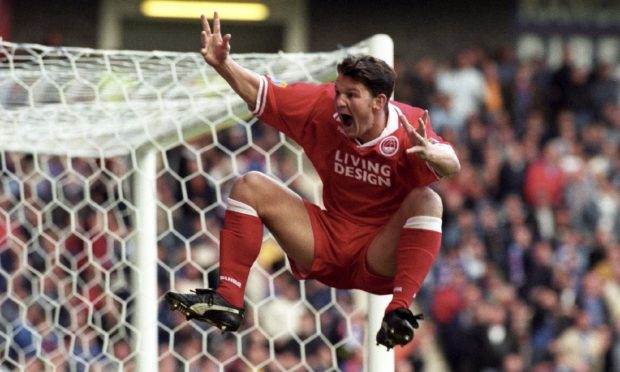Former Aberdeen striker Dean Windass says he has “just got to keep smiling and trying to help people” after being diagnosed with stage two dementia, aged just 55.
The Englishman’s diagnosis was first revealed by former Manchester United player David May on Friday’s BBC Breakfast television programme.
May was making an appearance on the daily morning news show to discuss rising cases of the degenerative neurological disease in retired footballers, with further research linking the upsurge in sufferers who have played professional football to heading balls during their playing careers.
During the segment, May said Windass’ diagnosis had left the ex-Don “worried sick of how it’s going to be in the future for him”.
May later took to X – prior a post from Windass himself – to confirm he had been given permission by the former Don to disclose the medical information about him in a phonecall on Thursday evening.
On X, following the news, Windass posted a video of himself miming along to Glen Campbell hit “Rhinestone Cowboy” in a car, with the message: “Just got to keep smiling and trying to help people.”
He later added, making light of the situation: “Seriously, I am ok. (I) was delighted to find out I had a brain.
“Just hope other families get the help what they want for the people they have lost.”
Type two dementia is often characterised by memory lapses like forgetting names and phrases, as well as misplacing personal items like keys, mobile phones and glasses.
Legendary American musician Campbell suffered from neurological condition Alzheimer’s Disease, and passed away, aged 81, in 2017.
Windass starred for the Dons from 1995-98, scoring 31 goals in 91 appearances.
After leaving Pittodrie he went on to star for Hull City, Sheffield United and Bradford City.
During his time at Hull, he famously scored the only goal of the 2008 English Championship play-off final – sealing a victory which took the Tigers in to the promised land of the Premier League for the first time in their history.
Reacting to Windass’ diagnosis, Caroline Scates, deputy director of admiral nurse development from Dementia UK, said: “We’re sorry to hear that Dean Windass has been diagnosed with dementia.
“By choosing to speak openly and publicly about his diagnosis, he will undoubtedly encourage others to seek support if they are concerned about symptoms they may be experiencing.
“There are estimated to be around 70,800 people living with young onset dementia in the UK – where symptoms occur before the age of 65.
“Obtaining a diagnosis of young onset dementia can be challenging, and it is often even harder to find age-appropriate support. But it is important to know that you are not alone and that expert care is available.
“We encourage anyone affected by young onset dementia to visit dementiauk.org/get-support for information resources and to find out how to access our national helpline and clinics services.”

Conversation